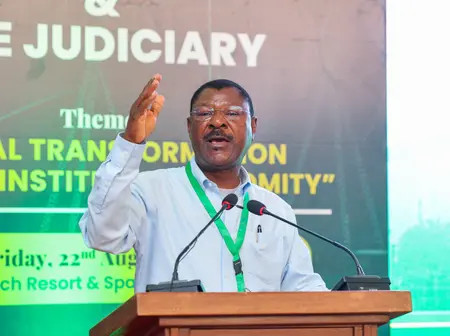National Assembly Speaker Rt. Hon. (Dr.) Moses Wetang’ula has expressed concern over what he termed the frequent issuance of conservatory orders by courts against Parliament, warning that the trend is increasingly disrupting legislative work.
Speaking during a joint session between National Assembly leaders and the Judiciary on the second day of the Third Leadership Retreat in Mombasa, Wetang’ula said several parliamentary proceedings and committee hearings had been stalled for months due to such orders.
“This is a matter that needs to be addressed by the Judiciary urgently. Some hearings are pushed up to six months ahead, which adversely affects the progress of legislation,” Wetang’ula said.
The retreat, attended by Chief Justice Martha Koome and senior judicial officers, also provided a platform for dialogue on strengthening institutional cooperation. Wetang’ula urged the Judiciary to centralize cases against Parliament in Nairobi, arguing that doing so would cut costs and improve efficiency.
“Currently, our lawyers are forced to travel to upcountry courts, only to find magistrates on leave or transferred with files,” he noted.
On judicial funding, Wetang’ula assured Chief Justice Koome of Parliament’s support in expanding the Judiciary’s budget, acknowledging its ambitious programme to improve access to justice.
Chief Justice Koome disclosed that the Judiciary aims to establish magistrates’ courts in all 290 constituencies but has so far managed only 143, blaming underfunding by the National Treasury. She appealed for parliamentary intervention to secure enhanced allocations.
“The Judiciary requires enhanced allocations for infrastructure development. This will ensure equitable access to justice across the country,” Koome said.
She emphasized that collaboration between the Judiciary and Legislature should not be misconstrued as undermining independence, noting that structured dialogue was essential to prevent adversarial relations.
“Institutional comity does not erode independence. There is a difference between institutional independence and decisional independence. While institutions may engage, decisional independence remains sacrosanct,” she affirmed.
National Assembly Clerk Samuel Njoroge also called for deeper cooperation in capacity building through collaboration between the Centre for Parliamentary Studies and Training (CPST) and the Kenya Judiciary Academy.
The retreat, themed “Social Transformation through Institutional Comity,” focused on shared priorities, fiscal planning for the 2025/26 financial year, and strategies to strengthen collaboration between Parliament and the Judiciary while safeguarding the principle of separation of powers.

Leave a Reply